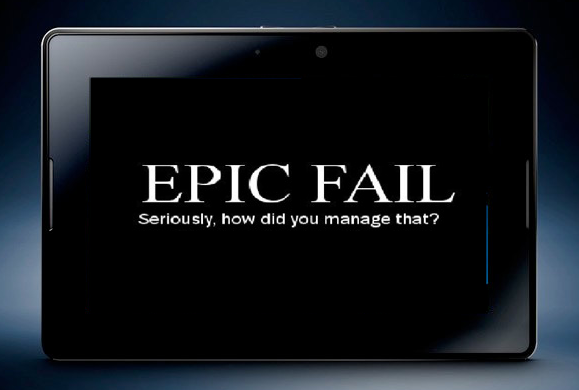
I attended RIM’s rollout of the BlackBerry PlayBook and they were kind enough to give each of us in attendee one to take home and use. Since that time I have taken the device out of its box every week or so to play with it a bit. Unfortunately, after using it for a brief time back into the box it goes. Time and again this is what happens.
It makes me sad. I love the hardware. The 7″ form factor is fantastic, the design of the tablet is quite nice and the OS is great. The screen is gorgeous and the speakers are probably the best speakers I have heard on a tablet yet. Yes, from a hardware perspective, the PlayBook runs second only to the iPad in my opinion.
Unfortunately, that’s just about all the good things I can say about the PlayBook. As you undoubtedly know RIM has been slow to release apps for the device, the promised ability to run Android applications is still nowhere to be found, and the company that made its name on e-mail and communication had the stupidity to release a tablet that didn’t have a native e-mail application AND IT STILL DOESN’T!!
As much as I feel bad for the company they really brought this on themselves.
For the longest time, I thought the lack of apps was the reason the PlayBook was pretty much a complete fail. An experience yesterday, however, pointed to another, perhaps more compelling reason why the PlayBook didn’t have a prayer even when it was released.
Before jumping into the specifics let me relate the conversation yesterday.
I was visiting a friend yesterday and she proudly told me that she had gotten both an iPad 2 and an iPhone.
“So the iPhone convinced you to get the tablet huh?” I quipped.
“No,” she said, “actually it was the other way around. I bought the iPad and then my BlackBerry had a bit of an accident. It got destroyed so I needed a new phone and I figured that since I already had the iPad I might as well get an iPhone too.”
So how does this explain what RIM did wrong with the PlayBook?
Simple, the company released a tablet that was a “companion device” to its smartphone even as people were fleeing their smartphone while Apple released a tablet that stood on its own.
The PlayBook is a nice device but to get the most from it you need to have a BlackBerry smartphone. Sure you can use the tablet on its own but if you do this you won’t be able to tap into all of the features of the tablet. And that isn’t because of the lack of apps, no, it was DESIGNED that way. As a result, not having a BlackBerry smartphone means your PlayBook is crippled from day one.
Apple, by comparison, is a company that likes to lock you into its ecosystem. Still, I can buy an iPhone and live perfectly well without an iPad. More pertinent to this post, I can buy an iPad, not have an iPhone or an iPod touch and I won’t see any loss of usability in the iPad. Each device is completely and truly independent of the other.
And while Apple’s new iCloud integration does bring all of their different devices together in a magical way, (I cannot tell you how cool it is to save a new Pages document on my iPhone and have it magically appear on my iPad) you don’t have to use the integration in order to get the most from the device. (And now that you can backup and sync with their cloud storage you don’t even need to have a computer nearby.)
The bottom line is this–in just about every single way RIM blew it with the PlayBook. Yes, I know that that is old news. But they didn’t just blow it because it’s “an app world” and they don’t have any. They blew it because the entire way they conceived of their tablet, as a companion device to BlackBerry smartphones, narrowed their market before the device was even released.
In a world where fewer and fewer people want BlackBerry smartphones releasing a tablet that relies on having one is just plain stupid. Sad to say, RIM pretty much made their own bed.
